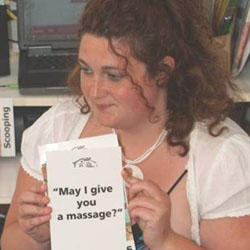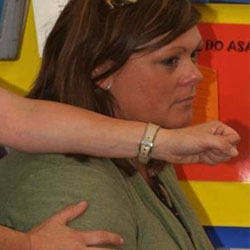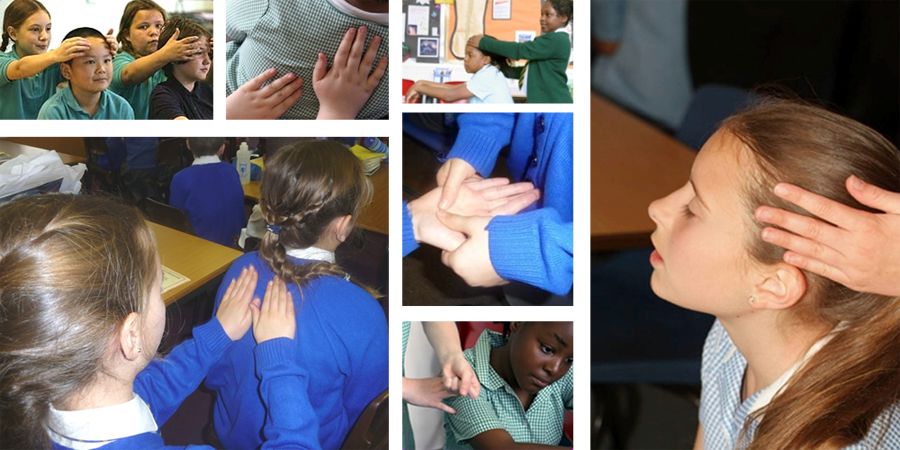Massage in schools: happier children for improved learning
The Massage in Schools Programme (MISP) introduces a simple, daily, 10 minute child-to-child massage routine into the classroom over full school uniform. The work is based on clear neurobiological and psychological principles to address calm vs. stress balance. Child-to-child massage is very effective in building emotional resilience and raising self esteem, most of all, it is a lot of fun!
After parental permission is gained, children are first taught the importance of respect by asking if their partner would like a massage.
Pupils learn to massage or trace shapes calmly on a partner’s back, shoulders, neck head and arms. The massage techniques, which are demonstrated by the teacher on another adult, could be strokes such as: the “bear-walk”, the “baker” or “butterfly”. But the result is always the same; pupils are left relaxed, positive, focused and prepared to learn.
Teachers do not massage children but do help children get creative in adapting the massage strokes into sequences that develop curriculum learning. Children have great fun making pizzas, planting gardens and visiting a zoo, all on a friend’s back! By drawing the letters of the alphabet on a friend’s back, children are able to improve their reading and writing skills.
MISP works particularly well in primary schools, although it can break down barriers and tensions between Year 7s as well. It increases children’s ability to socialise and make friends, and, because it reduces stress levels, it helps the brain to become more receptive to information.
Massage is a powerful antidote to bullying. In this fast-paced world of technology it is important for children to learn the value of human connection, to understand the feeling of “trust” and to develop empathy.
Benefits of the Massage in Schools Programme:
• Suitable for all children
• Creates a calm, relaxing, safe environment for learning
• Part of a PSHCE curriculum
• Promotes emotional resilience
• Helps children to learn more about themselves and each other
• Promotes empathy
• Is based upon shared respect
• Is delivered through an active learning model
• Empowers children by enabling them to rehearse positive language and language of choice
• Helps build self-esteem
• Improves communication
• Improves concentration
• Reduces the propensity for aggressive behaviour
• Improves social cohesion
Why train with Vital Sense?
Teacher led child-to-child massage sessions were introduced into several schools in Sweden in 1996 with children aged four years old upwards. The results were dramatic. Studies showed: a marked rise in concentration, children settled quicker and were more engaged in learning; children asked to borrow other children’s toys instead of snatching; children with an additional need such as ADHD (Attention Deficit Hyperactivity Disorder) developed better motor skills and there was a reduction in bullying and aggression in the school culture.
At Vital Sense, we believe passionately in the power of nurturing touch for the growing child and Carol, as the founder of Vital Sense, has been an active and passionate pioneer of the Massage in Schools Programme © since its introduction to the UK in 2000.
Since visiting Sweden and introducing the programme into the first school in England, we have witnessed first-hand its many benefits to children, teachers and parents. Carol has worked tirelessly to promote positive touch in primary schools in the UK and also at the transitional stages from nursery school to primary school and from primary school to secondary school. This includes working with the Department for Education (DfES), when Carol presented Massage in Schools Programme workshops through all regions in England at the DfES Anti-Bullying Conferences.
Carol is an experienced conference speaker, workshop facilitator and inset trainer she has facilitated over 100 training courses, including two visits to Australia and New Zealand. Carol was the founding chair of the Massage in Schools Association that supports the work of the Massage in Schools instructors trained with accredited MISP trainers, a position she held for 6 years. As it is so important to the health and wellbeing of children, Carol`s vision is to see child-to-child massage incorporated into the daily timetable of UK schools.
Massage provides direct experience of relating to others in a respectful, kind and gentle way with increased self-esteem. Massage activates a balancing of the autonomic nervous system, resulting in calmer and less stressed children with long-term benefits to the immune system.
Carol has produced a wonderful video / DVD Link to video] and authored the first MISP research study in the UK (2001).
What parents say about MISP…
“Neil came home full of enthusiasm for the Programme. We all now have free massages, including his disable sister. Great ideal!” (Year 5)
“Oliver is thoroughly enjoying his massage sessions and it is helping him learn respect for others and their space” (Year 1)
What teachers say about MISP…
“Children are more caring to each other, especially those who have not shown this side of their nature”
“Gives children the opportunity to succeed and shine”
“Children have learnt how to respect each other and be polite”
What children say about MISP…
“Massage make me fell happy and I have loads more friends”
“When I give a massage I feel good because I fell like I have helped someone.”
“Sometimes I dont feel like it so I say “No”, but that’s OK.”
“Since starting the massage Programme I don’t get bullied because I am friendlier”
“I can concentrate on my work for longer.”




